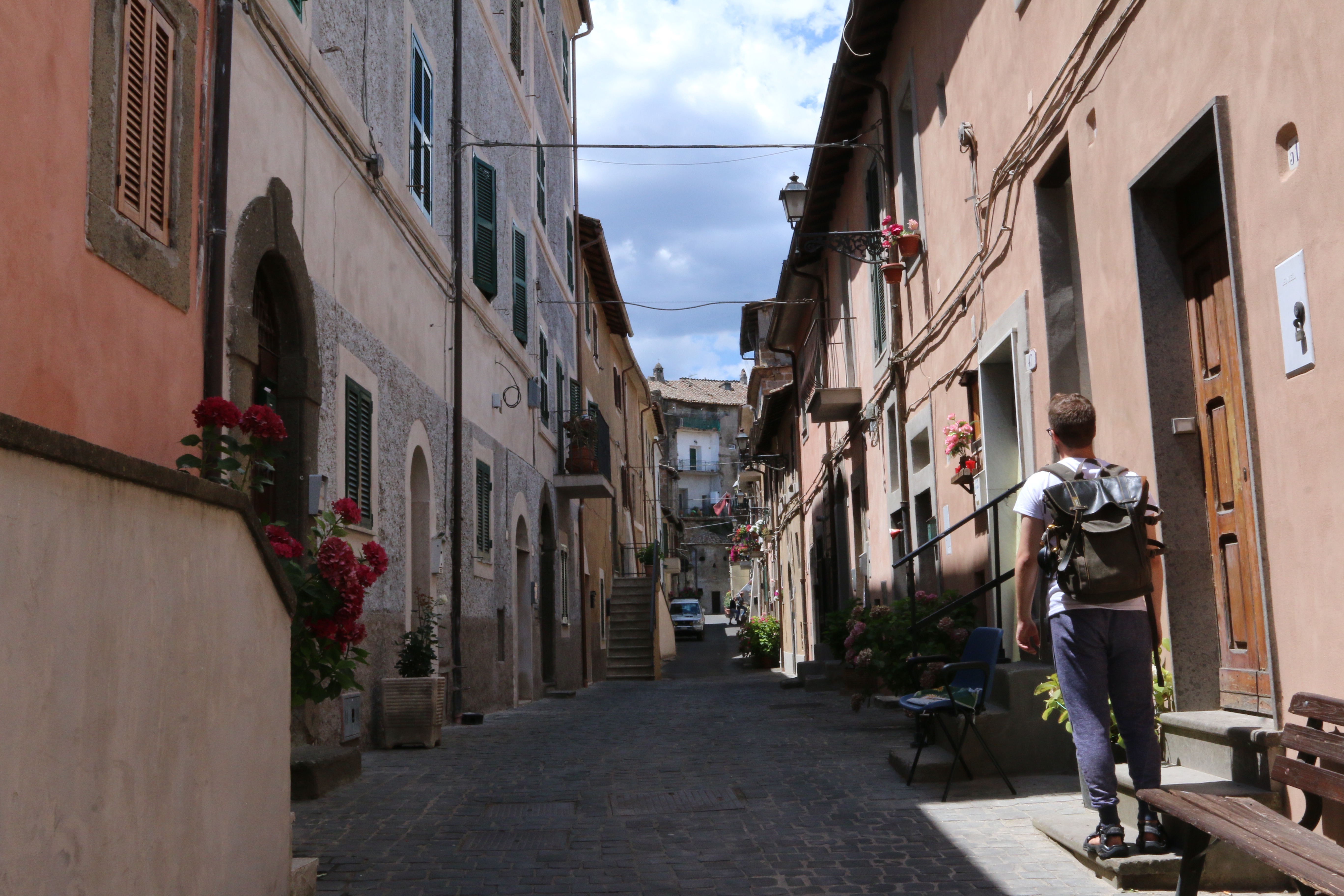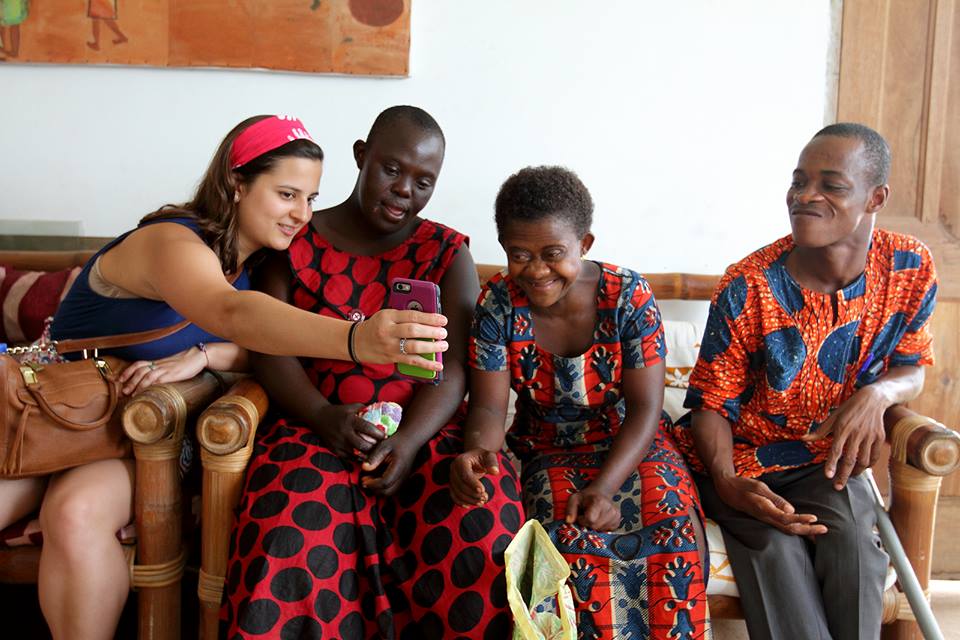Colombia. Morocco. Ecuador. Ghana. Italy. These are a few of the places across the globe where undergraduates spent their summers studying topics such as refugee integration and peace treaty implementation and learning how organizations work with local communities to address complex problems.
Seniors Claudia Serrano and Francesco Tassi were among 21 recipients of Kellogg/Kroc Undergraduate Research Grants for summer 2017. Administered by the Kellogg Institute and also supported by the Kroc Institute for International Peace Studies, these grants provide funding for students to conduct independent research abroad on topics related to the Institutes’ respective missions.
Serrano, who is double-majoring in economics and sociology with minors in both peace studies and international development studies, traveled to Colombia to explore how companies were reacting to the prospect of re-integrating ex-guerilla members into the workplace. As part of her research, she asked companies in the capital city of Bogota about their intent to hire ex-guerillas and interviewed several agencies to learn how the re-integration process has been envisioned.
“Being a peace studies student has not only given me more background information on other peace treaties and conflicts, allowing me to compare Colombia's to others,” she says, “but has also given me the ability to see the various alternatives that might exist when talking about putting an end to a conflict like [the one] in Colombia.” As a result, she notes, “it helped me deal with the harshness that might come when talking about war, allowing me to have a broad-open mind to the topic.”
 Tassi is majoring in international economics with a supplementary major in peace studies and a minor in international development studies. His research took him to six small towns in five different regions of Italy, where he worked with local administrations in order to research their System for the Protection of Asylum Seekers and Refugees (SPRAR).
Tassi is majoring in international economics with a supplementary major in peace studies and a minor in international development studies. His research took him to six small towns in five different regions of Italy, where he worked with local administrations in order to research their System for the Protection of Asylum Seekers and Refugees (SPRAR).
To gauge the level of integration in each town, Tassi surveyed both the refugees in the SPRAR as well as the town’s Italian citizens. He interviewed refugees in French, English and Italian, and conducted other interviews with integration teams, local businesses, religious leaders and local governments. He hopes that this research will ultimately help him identify the challenges and best practices for integrating refugees in Italy, and how these practices—as well as how they are perceived by Italian citizens and refugees—change from region to region across the country.
“Peace studies is unlearning what you believed,” he said. “It teaches you to appreciate being uncomfortable, as there we are often closest to the truth. Peace studies has taught me to constantly listen—to think with a curious, critical mind. This has led me to love research in the first place, and allowed me to be where I am today.”
While Tassi and Serrano opted for independent research projects, other peace studies students pursued summer internships abroad through Kellogg Summer Entrepreneurial Internships, which provide students with funding to work with nongovernmental organizations and policy institutes in Africa, Asia, Latin America, and the United States.
 Karina Chamorro is a political science major with minors in peace studies and education, schooling and society. She spent her summer in Ho, Ghana, working with the Kekeli Foundation, an organization that advocates for the rights of persons with disabilities through a variety of programs and services.
Karina Chamorro is a political science major with minors in peace studies and education, schooling and society. She spent her summer in Ho, Ghana, working with the Kekeli Foundation, an organization that advocates for the rights of persons with disabilities through a variety of programs and services.
In her internship, Karina assisted the organization with its day-to-day operations and special programs, attended an inclusive education conference, and studied technologies and communication methods that children with disabilities can use in the classroom and at home.
Her experience taught her a lot about Ghanaian perception of disability, she says. These perceptions, based on traditional customs and beliefs, affect the way a person with disabilities is mistreated, neglected and excluded. “Being a peace studies student has made me realize the importance of respecting and understanding the host country's customs and beliefs when trying to find solutions to problems.”
Beth Vander Hoek, a political science major and peace studies minor who is part of the Glynn Family Honors Program, also travelled to Africa, selecting a placement in Morocco through the international organization WorldTeach. As a volunteer English teacher, she spent two weeks teaching in Rabat and then moved to Sidi Moumen, a former shantytown in Casablanca, for her remaining six weeks. She taught at the IDMAJ Neighborhood Association center, which supports at-risk kids and vulnerable youth through artistic activities, language tutoring and other programs.
As an intern at IDMAJ, she taught two beginning English classes every day, one in the morning for students aged 8-12 and an afternoon one for teenagers. She also taught a choice class twice a week and participated in cultural activities and performances held at the center. One of the most important opportunities, though, involved hosting a roundtable discussion with some of the local teenagers who volunteer with IDMAJ.
“These students,” she recalls, “provided me with their viewpoints regarding American stereotypes of Islam as a violent religion and emphasized the real themes of Islam: peace, love, and community.”
Allison Hidalgo, a member of the Kellogg International Scholars Program, used her internship to help integrate her interests in business, peace studies, development, and social entrepreneurship.
A junior majoring in finance with a supplementary major in peace studies, she spent eight weeks in Archidona, Ecuador, working with Fundación Runa. This organization works to protect the rainforest ecosystem while also helping indigenous Kichwa farmers create greater market value for their goods.
Her main projects involved helping a Kichwa-owned business measure its impact on stakeholders and conducting surveys and interviews with the indigenous, Kichwa farmers in order to understand the role of women in the production of guayusa, a local tea.
“As a peace studies student, I had the opportunity to take a social entrepreneurship class that hugely shaped my experience in Ecuador,” she explained. “Due to this class, I understood the importance of sustainable, social businesses prior to my arrival in Ecuador. I was able to explore some of the local, Kichwa-started and owned businesses, and I better understood how social businesses such as Runa LLC, the business branch of Fundación Runa, are attempting to overturn unfair equilibriums and provide more opportunities for the Kichwa people.”
Find out what you can do through the international institutes—from research to internships to conferences to academic programs—at this upcoming event:
“Beyond Study Abroad: Opportunities and Success Stories from Students in the Institutes”
Wednesday, November 29, 6:30 pm
Auditorium, Hesburgh Center for International Studies
More information on Kellogg/Kroc Research Grants, previous recipients, and how to apply here.
More information on Kellogg Summer Entrepreneurial Internships, previous recipients, and how to apply here.
First posted at kroc.nd.edu
The Kellogg Institute for International Studies, part of the University of Notre Dame’s new Keough School of Global Affairs, is an interdisciplinary community of scholars and students from across the University and around the world that promotes research, provides educational opportunities, and builds linkages related to two topics critical to our world—democracy and human development.





